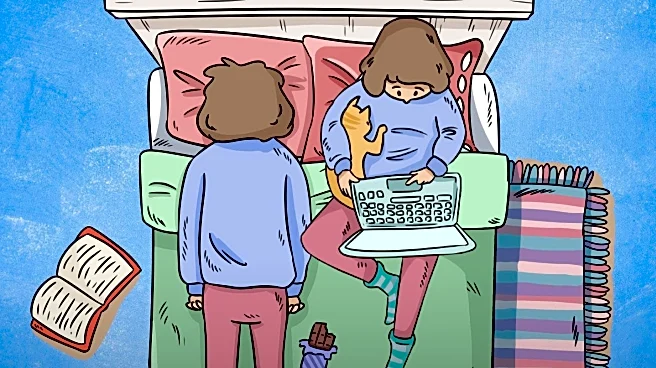What's Happening?
Penn and Kim Holderness, known for their digital content and as winners of The Amazing Race, have released their first children's picture book titled 'All You Can Be with ADHD.' The book is a rhyming celebration
of the unique qualities of having a brain that works differently, inspired by their family's experiences with ADHD. Penn and their son both have ADHD, which influenced the creation of this book. The Holdernesses aim to provide a positive representation of ADHD, emphasizing that individuals with ADHD are not alone and can lead successful lives. The book is published by Little, Brown, who quickly understood the urgency and importance of the project, leading to a multi-book deal.
Why It's Important?
The release of 'All You Can Be with ADHD' is significant as it addresses the underrepresentation and stigma associated with ADHD, particularly in children. By providing a positive narrative, the Holdernesses hope to foster acceptance and understanding among children and adults alike. The book aims to be a resource in schools and libraries, encouraging conversations between parents and children about neurodiversity. It also highlights the importance of inclusivity, featuring diverse characters to ensure all children can see themselves in the story. This initiative could lead to increased awareness and diagnosis of ADHD, especially in underdiagnosed communities.
What's Next?
Following the release of their picture book, Penn and Kim Holderness plan to continue their work in children's literature. They are developing a new book focused on practical ways to manage daily tasks, which is particularly relevant for individuals with ADHD. Additionally, they are exploring the possibility of creating a tween graphic novel. The Holdernesses aim to use their platform to support neurodiversity and erase the shame associated with it, hoping to inspire others and provide positive examples for children with ADHD.
Beyond the Headlines
The Holdernesses' work in promoting neurodiversity through children's literature could have long-term cultural impacts. By normalizing ADHD and other neurodiverse conditions, they contribute to a broader societal shift towards acceptance and understanding. Their efforts may encourage more authors and creators to address similar themes, leading to a richer diversity of voices and stories in children's literature. This could ultimately influence educational practices and policies, promoting inclusivity and support for neurodiverse students.








